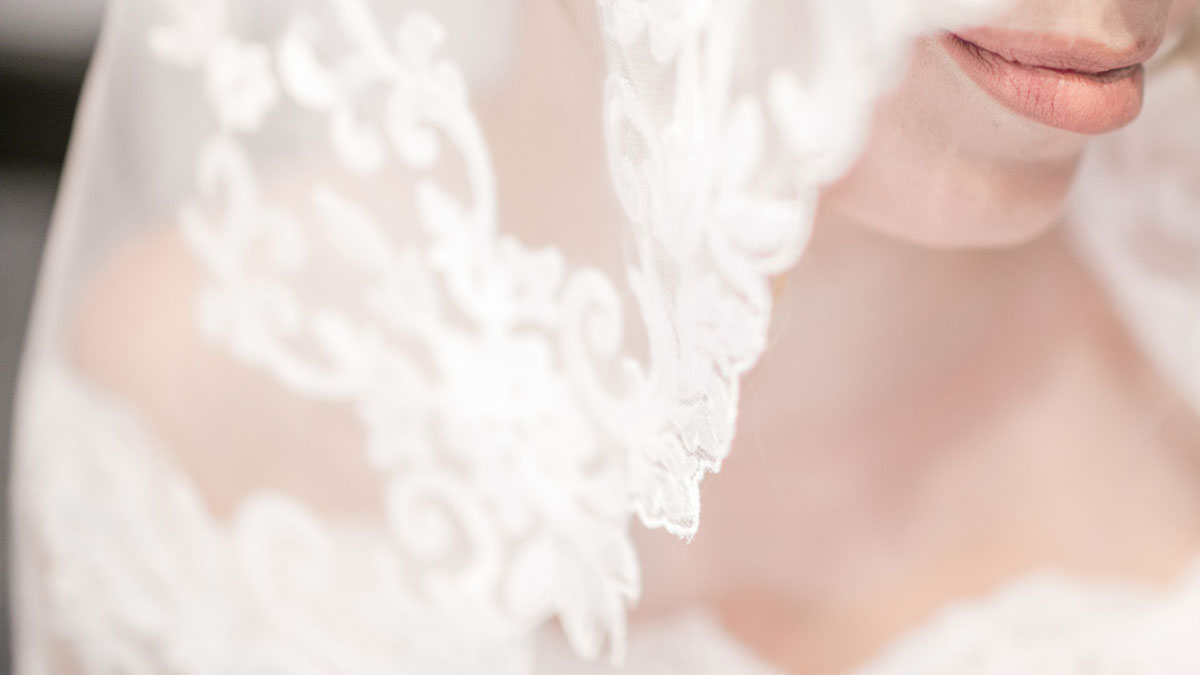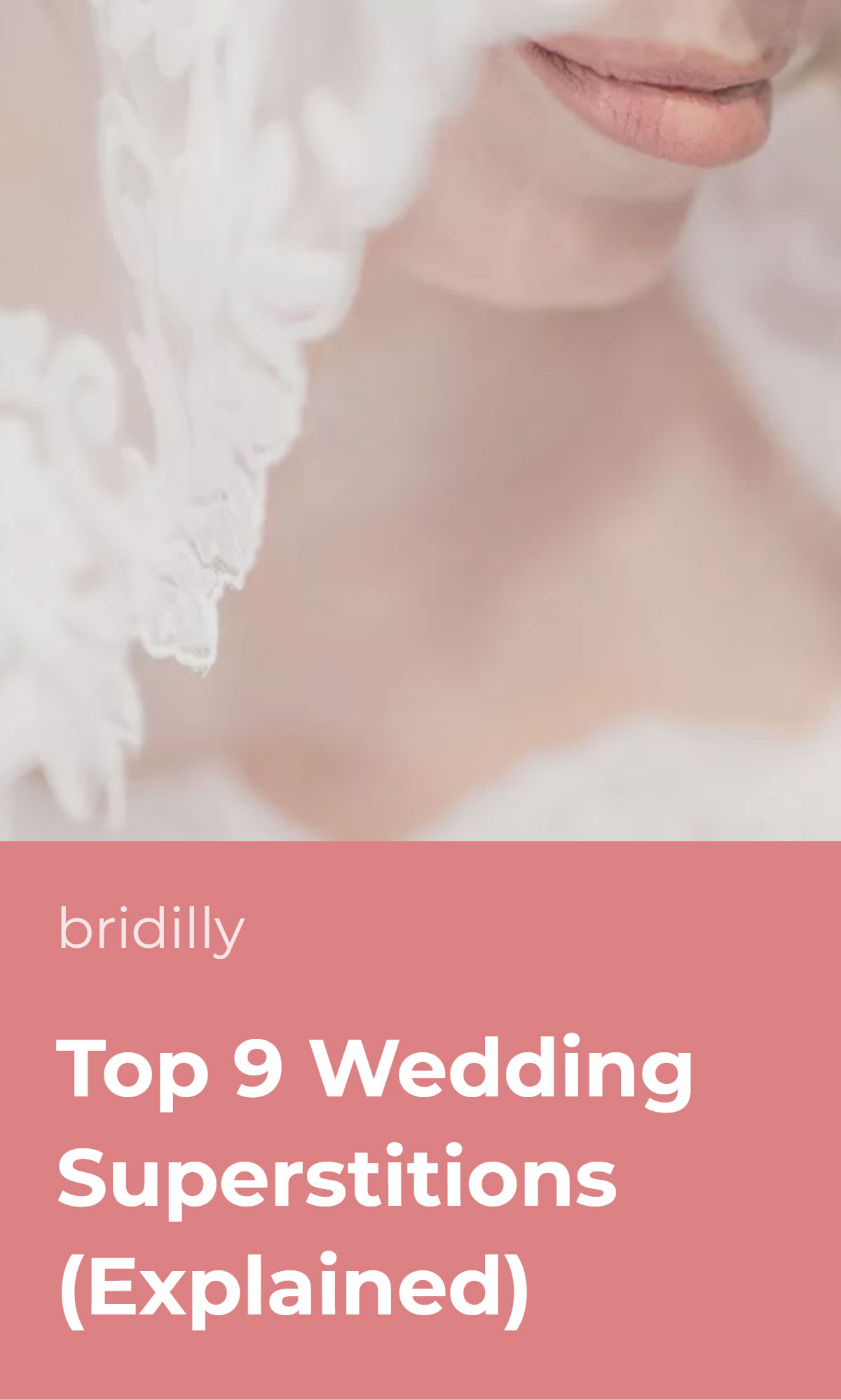You’ve likely heard of numerous wedding superstitions and traditions from your close relatives and acquaintances, especially those of the older generation.
The question is, are they worth your attention?
The bride should be in white, wear a veil, something old, new, borrowed, and blue. These traditions are easy to follow and don’t seem to hurt anyone.
But following them certainly isn’t a guarantee of a happy marriage, just like refraining from them won’t hurt your relationship.
Superstitions apply to the gifts a couple receives, too. Should you give back or throw in trash knives, clocks, or umbrellas? Likely not.
Better send your guests “thank you” notes and use the gifts as intended; they’re all rather practical.
Some wedding superstitions have a beautiful symbolism, while others stem from the times when arranged marriages were common practice.
Following the former is a nice gesture, but it’s odd to follow the latter if your marriage isn’t forced.
Of course, there’s nothing wrong in trying to please your superstitious family members or in believing certain items can bring you good luck.
After all, it’s all about staying confident in your choice and true to your principles.
Table of Contents [show]
1. The Veil
Not all modern brides are wearing a veil, yet the tradition remains strong. But why did brides start wearing veils in the first place?
The custom dates back to the Ancient Roman Empire, where the veil was supposed to protect the bride from demons and witches. Since, as they could not see her face through the fabric, they couldn’t curse her.
Regardless of whether you believe in evil spirits, veils are simply beautiful. They also symbolize modesty and obedience, along with the white dress that stands for chastity.
Another reason for wearing a veil isn’t tied to superstition but rather to historical context. For example, veils were used to hide the bride’s face from the groom in arranged marriages.
2. Prohibited Wedding Gifts
Wedding superstitions relate not only to the marrying couple but also to guests. So, some gifts are considered a bad choice to this day, unless you genuinely hate the couple.
According to common belief, knives signify a broken marriage and giving them as a gift may bring bad luck to the couple.
Although it’s a rather practical gift, perhaps, a set of plates is a better choice. Despite being a practical item, a handkerchief is mainly used for wiping tears and thus isn’t a good gift either.
Another superstition states you shouldn’t gift an umbrella. But, on the other hand, rain on a wedding day is considered good luck. So it looks like everyone should just be prepared to get wet.
Gifting clocks is considered bad luck, too. In Chinese, “give a clock” sounds the same as “attend a father’s funeral,” which doesn’t sound like a pleasant greeting.
Lastly, don’t give a mirror as a wedding gift. Everyone knows a broken mirror means seven years of bad luck. Regardless of whether you believe in superstitions, no one would like to check whether this is true.
3. Carrying Bride Over The Threshold
The tradition of carrying the bride over the threshold goes back numerous centuries.
Ancient people believed that a new couple was susceptible to evil spirits. By carrying the bride, the groom protects her from tripping and thus avoids bad luck.
Another version is based on the belief that family demons may follow the bride into her new house. Thus, the groom protects his home from evil spirits rather than the bride by carrying her over the threshold.
A different explanation of this superstition stems from the fact that arranged marriages were widespread when it was invented.
Unsurprisingly, brides often didn’t want to step into the groom’s house and had to be dragged in. So, if you’re marrying willingly, you may ignore this tradition.
4. Breaking Glass
Breaking glass isn’t rare at weddings, and the reason for this isn’t always the clumsiness of guests or the couple. Often, it’s done intentionally, following a popular superstition.
In ancient times, people believed that a couple would spend together as many years as the number of pieces the glass would shatter into.
The tradition has Jewish roots, yet you don’t have to be Jewish to appreciate how meaningful it is.
Some people associate glass with the fragility of life and marriage in particular. By breaking glass, you scare away evil spirits that may hurt your relationship.
Another interpretation of the tradition is that by breaking glass, the couple acknowledges the inevitable hardships in any marriage.
No matter which interpretation you like the most, breaking glass is a very symbolic wedding tradition. However, it isn’t mandatory, and you can avoid cleaning up tiny pieces of glass by not following it.
5. Why White?
Today, most brides choose white dresses because it’s the tradition or because they symbolize purity and virtue. But historically, wedding dresses weren’t always white.
In Western culture, brides used to choose dresses of color other than white due to practical reasons.
Clothing wasn’t as accessible as nowadays, so brides either wore the best of dresses they already owned or bought something they could wear after the event.
Plus, white was too challenging to clean, so red, tan, or green dresses were a much more popular choice.
So, how did the tradition to wear white wedding dresses originate, then?
Most historians agree that it was influenced mainly by the royal wedding of Queen Victoria and Prince Albert back in the 19th century.
So, if you’re not a fan of white and Victorian Era, you can safely wear a dress of any color you prefer – no tradition will be desecrated.
6. Old, New, Borrowed, & Blue
Perhaps, while planning your wedding attire, you’ve heard you should wear something old, new, borrowed, and blue at least once from your granny or mom.
It’s one of the most followed wedding traditions to our day. This may be because it doesn’t involve hazards such as broken glass, but maybe modern brides just like the symbolism.
The tradition derives from an old British rhyme quoting “Something Olde, Something New, Something Borrowed, Something Blue, A Sixpence in your Shoe.”
All these objects were meant to bring good luck to the couple. But, for some reason, the sixpence is usually neglected.
More specifically, “something old” represents continuity and respect for family heritage. It’s meant to ward off Evil Eye that may cause infertility in the bride.
“Something new” symbolizes a happy future. “Something borrowed” allegedly brings good luck to the couple.
Lastly, “something blue” stands for love, purity, and fidelity, the three characteristics of a solid marriage.
Even if you don’t think some items can dictate your luck, wearing something borrowed from your loved ones is a nice gesture. And blue goes perfectly with white.
7. Seeing a Nun or Monk
Seeing a nun or a monk on your way to the wedding is believed to be a curse. A couple who sees it would depend on charity throughout all marriage.
The roots of this superstition are hard to track. Furthermore, it isn’t clear how the rule should work for couples opting for religious ceremonies held at churches full of monks and nuns.
Another belief states that seeing a pregnant woman on the way to a wedding brings bad luck.
Frankly, that doesn’t make much sense considering that pregnancy is a happy time. And it’s certainly not a reason not to invite your pregnant cousin to the wedding.
8. Using Married Name Before The Wedding
Using your married name before the wedding doesn’t make practical sense. Why use a surname different from that in your passport? However, it also shouldn’t be done according to a common belief.
Superstition says the wedding won’t take place if you use the married name before the event, even accidentally. This may have something to do with Murphy’s law. Jokes aside, the belief is so old its origin has faded.
The superstition applies to monograms, too. Not sure how brides who wish to use monogramming for wedding décor should act in this case. Either way, avoid using your married monogram until you’ve changed the name officially.
9. Seeing Bride in Dress Before The Wedding
Not seeing each other before the wedding is a common practice. Some do this to create a wow effect and capture genuine emotions in pictures.
Other couples get ready separately and simply don’t have time to see each other before meeting at the altar. But a large part of couples avoids seeing each other due to ancient superstition.
Unsurprisingly, the tradition originated from times when most marriages were arranged. At that time, the superstition didn’t anticipate the bride and groom shouldn’t meet on the morning of the wedding.
They could have never met each other at all. If the bride and groom had met each other before they stood at the altar, they might have refused to marry or even run away.
Thankfully, today, you have a choice of whom to marry and likely have chosen the groom yourself. So, following this superstition is unnecessary unless you want to make your attire a surprise.
By the way, there’s a similar superstition that says the groom shouldn’t see the bride in her dress before the wedding.
This was meant to bring bad luck for the groom and heartbreak for the bride. But, of course, today, you can even go to buy the wedding dress together or arrange a pre-wedding photoshoot.













No Comments Add one
Leave a Comment